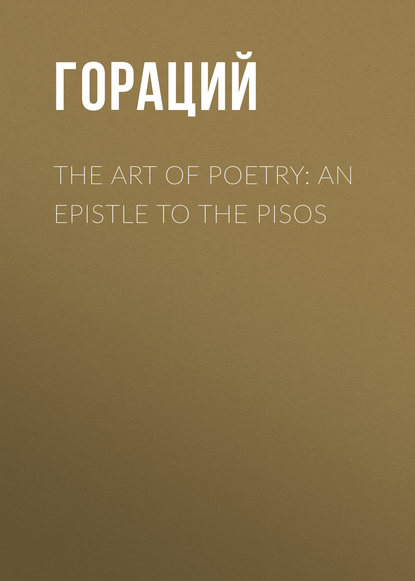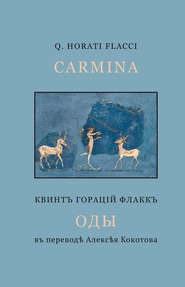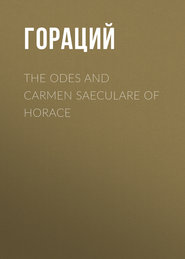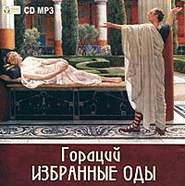По всем вопросам обращайтесь на: info@litportal.ru
(©) 2003-2024.
✖
The Art of Poetry: an Epistle to the Pisos
Настройки чтения
Размер шрифта
Высота строк
Поля
Rem poteris servare tuam. Redit uncia: quid fit?
On Nature's pattern too I'll bid him look,
And copy manners from her living book.
Sometimes 'twill chance, a poor and barren tale,
Where neither excellence nor art prevail,
With now and then a passage of some merit,
And Characters sustain'd, and drawn with spirit,
Pleases the people more, and more obtains,
Than tuneful nothings, mere poetick strains.
The Sons of Greece the fav'ring Muse inspir'd,
Inflam'd their souls, and with true genius fir'd:
Taught by the Muse, they sung the loftiest lays,
And knew no avarice but that of praise.
The Lads of Rome, to study fractions bound,
Into an hundred parts can split a pound.
"Say, Albin's Hopeful! from five twelfths an ounce,
And what remains?"—"a Third."—"Well said, young Pounce!
You're a made man!—but add an ounce,—what then?"
"A Half." "Indeed! surprising! good again!"
Semis. An haec animos aerugo et cura peculi
Cum semel imbuerit speramus carmina singi
Posse linenda cedro, et levi servanda cupresso?
Aut prodesse volunt, aut delectare poetae;
Aut simul et jucunda et idonea dicere vitae.
Quicquid praecipies, esto brevis: ut eito dicta
Percipiant animi dociles, tencantque fideles.
Omni supervacuum pleno de pectore manat.
Ficta voluptatis causa sint proxima veris:
Ne, quodcumque volet, poscat fibi fabula credi;
Neu pransea Lamiae vivum puerum extrahat alvo.
Centuriae seniorum agitant expertia frugis:
Celsi praetereunt austera poemata Rhamnes.
Omne tulit punctum, qui miscuit utile dulci,
Lectorem delectando, pariterque monendo
From minds debas'd with such a sordid lust,
Canker'd and eaten up with this vile rust,
Can we a verse, that gives the Genius scope,
Worthy the Cedar, and the Cypress, hope?
Instruction to convey and give delight,
Or both at once to compass, Poets write:
Short be your precepts, and th' impression strong,
That minds may catch them quick, and hold them long!
The bosom full, and satisfied the taste,
All that runs over will but run to waste.
Fictions, to please, like truths must meet the eye,
Nor must the Fable tax our faith too high.
Shall Lamia in our fight her sons devour,
And give them back alive the self-same hour?
The Old, if Moral's wanting, damn the Play;
And Sentiment disgusts the Young and Gay.
He who instruction and delight can blend,
Please with his fancy, with his moral mend,
Hic meret aera liber Sofiis, hic et mare transit,
Et longum noto scriptori prorogat aevum.
Sunt delicta tamen, quibus ignovisse velimus.
Nam neque chorda sonum reddit, quem vult manus et mens;
Poscentique gravem persaepe remittit acutum:
Nec semper feriet, quodcumque minabitur, arcus.
Verum ubi plura nitent in carmine, non ego paucis
Offendar maculis, quas aut incuria fudit,
Aut humana parum cavit natura quid ergo est?
Ut scriptor si peccat idem librarius usque,
Quamvis est monitus, veniâ caret; ut citharoedus
Ridetur, chordâ qui semper oberrat eâdem;
Hits the nice point, and every vote obtains:
His work a fortune to the Sosii gains;
Flies over seas, and on the wings of Fame
Carries from age to age the writer's deathless name.
Yet these are faults that we may pardon too:
For ah! the string won't always answer true;
But, spite of hand and mind, the treach'rous harp
Will sound a flat, when we intend a sharp:
The bow, not always constant and the same,
Will sometimes carry wide, and lose its aim.
But in the verse where many beauties shine,
I blame not here and there a feeble line;
Nor take offence at ev'ry idle trip,
Where haste prevails, or nature makes a slip.
What's the result then? Why thus stands the case.
As the Transcriber, in the self-same place
Who still mistakes, tho' warn'd of his neglect,
No pardon for his blunders can expect;
Or as the Minstrel his disgrace must bring,
Who harps for ever on the same false string;
Sic mihi qui multum cessat, fit Choerilus ille,
Quem bis terve bonum, cum risu miror; et idem
Indignor, quandoque bonus dormitat Homerus.
Verum operi longo fas est obrepere somnum.
Ut pictura, poësis: erit quae, si propius stes,
Te capiat magis; et quaedam, si longius abstes:
Haec amat obscurum; volet haec sub luce videri,
On Nature's pattern too I'll bid him look,
And copy manners from her living book.
Sometimes 'twill chance, a poor and barren tale,
Where neither excellence nor art prevail,
With now and then a passage of some merit,
And Characters sustain'd, and drawn with spirit,
Pleases the people more, and more obtains,
Than tuneful nothings, mere poetick strains.
The Sons of Greece the fav'ring Muse inspir'd,
Inflam'd their souls, and with true genius fir'd:
Taught by the Muse, they sung the loftiest lays,
And knew no avarice but that of praise.
The Lads of Rome, to study fractions bound,
Into an hundred parts can split a pound.
"Say, Albin's Hopeful! from five twelfths an ounce,
And what remains?"—"a Third."—"Well said, young Pounce!
You're a made man!—but add an ounce,—what then?"
"A Half." "Indeed! surprising! good again!"
Semis. An haec animos aerugo et cura peculi
Cum semel imbuerit speramus carmina singi
Posse linenda cedro, et levi servanda cupresso?
Aut prodesse volunt, aut delectare poetae;
Aut simul et jucunda et idonea dicere vitae.
Quicquid praecipies, esto brevis: ut eito dicta
Percipiant animi dociles, tencantque fideles.
Omni supervacuum pleno de pectore manat.
Ficta voluptatis causa sint proxima veris:
Ne, quodcumque volet, poscat fibi fabula credi;
Neu pransea Lamiae vivum puerum extrahat alvo.
Centuriae seniorum agitant expertia frugis:
Celsi praetereunt austera poemata Rhamnes.
Omne tulit punctum, qui miscuit utile dulci,
Lectorem delectando, pariterque monendo
From minds debas'd with such a sordid lust,
Canker'd and eaten up with this vile rust,
Can we a verse, that gives the Genius scope,
Worthy the Cedar, and the Cypress, hope?
Instruction to convey and give delight,
Or both at once to compass, Poets write:
Short be your precepts, and th' impression strong,
That minds may catch them quick, and hold them long!
The bosom full, and satisfied the taste,
All that runs over will but run to waste.
Fictions, to please, like truths must meet the eye,
Nor must the Fable tax our faith too high.
Shall Lamia in our fight her sons devour,
And give them back alive the self-same hour?
The Old, if Moral's wanting, damn the Play;
And Sentiment disgusts the Young and Gay.
He who instruction and delight can blend,
Please with his fancy, with his moral mend,
Hic meret aera liber Sofiis, hic et mare transit,
Et longum noto scriptori prorogat aevum.
Sunt delicta tamen, quibus ignovisse velimus.
Nam neque chorda sonum reddit, quem vult manus et mens;
Poscentique gravem persaepe remittit acutum:
Nec semper feriet, quodcumque minabitur, arcus.
Verum ubi plura nitent in carmine, non ego paucis
Offendar maculis, quas aut incuria fudit,
Aut humana parum cavit natura quid ergo est?
Ut scriptor si peccat idem librarius usque,
Quamvis est monitus, veniâ caret; ut citharoedus
Ridetur, chordâ qui semper oberrat eâdem;
Hits the nice point, and every vote obtains:
His work a fortune to the Sosii gains;
Flies over seas, and on the wings of Fame
Carries from age to age the writer's deathless name.
Yet these are faults that we may pardon too:
For ah! the string won't always answer true;
But, spite of hand and mind, the treach'rous harp
Will sound a flat, when we intend a sharp:
The bow, not always constant and the same,
Will sometimes carry wide, and lose its aim.
But in the verse where many beauties shine,
I blame not here and there a feeble line;
Nor take offence at ev'ry idle trip,
Where haste prevails, or nature makes a slip.
What's the result then? Why thus stands the case.
As the Transcriber, in the self-same place
Who still mistakes, tho' warn'd of his neglect,
No pardon for his blunders can expect;
Or as the Minstrel his disgrace must bring,
Who harps for ever on the same false string;
Sic mihi qui multum cessat, fit Choerilus ille,
Quem bis terve bonum, cum risu miror; et idem
Indignor, quandoque bonus dormitat Homerus.
Verum operi longo fas est obrepere somnum.
Ut pictura, poësis: erit quae, si propius stes,
Te capiat magis; et quaedam, si longius abstes:
Haec amat obscurum; volet haec sub luce videri,
Другие электронные книги автора Квинт Гораций Флакк
Другие аудиокниги автора Квинт Гораций Флакк
Избранные оды




 4.67
4.67












